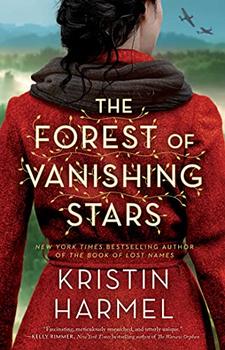Summary | Excerpt | Reading Guide | Reviews | Beyond the Book | Read-Alikes | Genres & Themes | Author Bio

A Novel
by Kristin HarmelThis article relates to The Forest of Vanishing Stars
 In The Forest of Vanishing Stars, persecuted Jews in Eastern Europe take shelter in the Naliboki Forest, located west of Minsk in contemporary Belarus. The area, then known as Byelorussia, was annexed by the Soviet Union in 1939 at the same time as Germany invaded Poland as part of the Molotov-Ribbentrop Pact that established a non-aggression agreement between Germany and the Soviet Union, and detailed how Finland, Poland, Romania and the Baltic states would be divided between them. In June 1941, Germany broke the treaty and invaded the western territories of the Soviet Union including Byelorussia (i.e. the Eastern Front, from the European perspective). It held the region until the USSR took back control in August 1944.
In The Forest of Vanishing Stars, persecuted Jews in Eastern Europe take shelter in the Naliboki Forest, located west of Minsk in contemporary Belarus. The area, then known as Byelorussia, was annexed by the Soviet Union in 1939 at the same time as Germany invaded Poland as part of the Molotov-Ribbentrop Pact that established a non-aggression agreement between Germany and the Soviet Union, and detailed how Finland, Poland, Romania and the Baltic states would be divided between them. In June 1941, Germany broke the treaty and invaded the western territories of the Soviet Union including Byelorussia (i.e. the Eastern Front, from the European perspective). It held the region until the USSR took back control in August 1944.
In crafting this fascinating historical novel, Kristin Harmel drew on real-life stories including that of the Bielski brothers, who grew a small army of resistance fighters and protected Jews who had fled from the surrounding areas seeking safety from the Nazis. The Bielskis' story begins in 1941 when brothers Tuvia, Alexander, Asael and Aron disappeared into the forest after their mother, father and other siblings were killed in the Nowogrodek ghetto. Tuvia was a former Polish Army corporal and an outspoken Zionist and he became the leader of the group as the brothers began recruiting friends and family, and then strangers, from nearby ghettos to join the Resistance. They also amassed weapons with the help of non-Jewish friends sympathetic to the cause.
The Bielski Partisans had two goals — they wished to fight back against the Nazis, but they also recognized the importance of protecting other Jews; and the brothers and other leaders of the group were sometimes in conflict about how to prioritize these two goals. They regularly sent scouts out to look for fleeing Jews, and in late 1942, they undertook a rescue mission when the ghetto in the town of Iwie was to be liquidated, saving over 100 lives. While Tuvia reportedly proclaimed, "I would rather save one old Jewish woman than kill ten Nazi soldiers," the other brothers and their recruited resistance fighters were more focused on fighting back. They joined forces with Soviet Partisans to attack German military facilities. They sabotaged German equipment and infrastructure used for military transport. They also assassinated Nazi collaborators who had turned in their Jewish neighbors.
The Bielskis attracted the Nazis' attention and ire and there was a 100,000 Reichmark reward for Tuvia Bielski's capture. The brothers needed to constantly move their group to new locations to stay ahead of the Nazis. The group escaped one attack in the summer of 1943 but a second attack killed 10 people, and the brothers (who all survived) led the group deeper into the forest where they formed a new camp known as Jerusalem. Completed in late fall of 1943, just ahead of the bitterly cold winter season, Jerusalem contained more than 800 people and was, in essence, a fully operational village, with craftsmen plying their trades as cobblers, carpenters and blacksmiths. There was an infirmary, a school and a synagogue. At the time the Soviet Red Army officially liberated the forest in July 1944, the camp had over 1,200 residents.
After the war, Tuvia, Alexander and Aron Bielski moved to Palestine and eventually to the United States. Asael was conscripted into the Soviet Army and died in battle in 1945. The story of the Bielski Partisans was adapted into a 2008 film called Defiance starring Daniel Craig and Liev Schreiber.
Bielski partisans, courtesy of Yad Vashem
Filed under People, Eras & Events
![]() This "beyond the book article" relates to The Forest of Vanishing Stars. It originally ran in July 2021 and has been updated for the
May 2022 paperback edition.
Go to magazine.
This "beyond the book article" relates to The Forest of Vanishing Stars. It originally ran in July 2021 and has been updated for the
May 2022 paperback edition.
Go to magazine.
Your guide toexceptional books
BookBrowse seeks out and recommends the best in contemporary fiction and nonfiction—books that not only engage and entertain but also deepen our understanding of ourselves and the world around us.